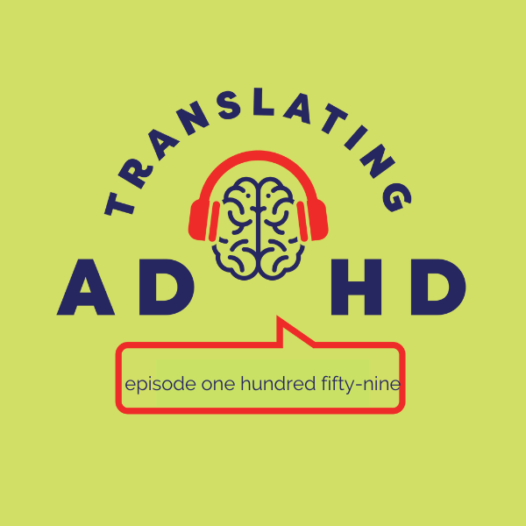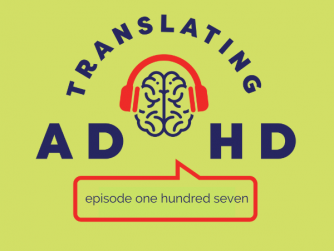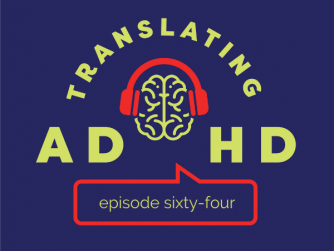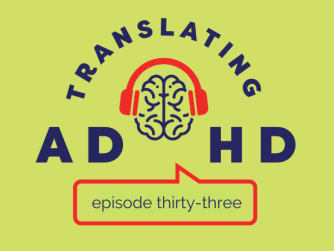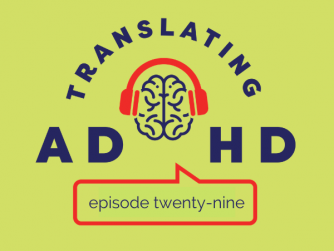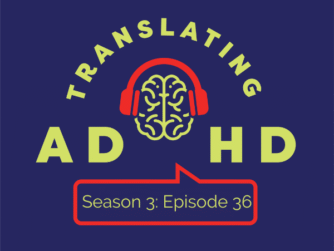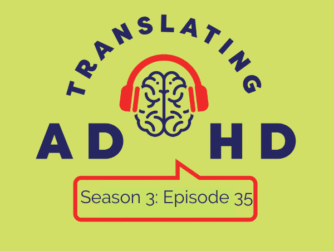Ash and Cam continue to look at the dynamic nature of boundary creation and management by revisiting the very popular Adrenaline Response Cycle from Episode 4. The hosts share how our boundaries naturally adjust as a result of our current mode of activity. For so many of us with ADHD our daily mode is governed by the ARC Model – when we are beholden to the urgency of the current big signal. This urgency elicits an adrenaline and dopamine response that allows us to access our task management network and engage with our work. Ash and Cam actually focus more on the periods of the cycle other than the intense activity period, when we are enjoying a state of hyper-focus.
Asher shares how he has learned to develop healthy boundaries around his own recovery periods, distinguishing healthy recovery time from post-crash recovery time. We often put so much focus on production and hyper-focus , we don’t realize the cost of a prolonged crash/recovery sequence. Ash reshares his Hoth rebel base metaphor for recovery periods he had little agency over. Finally, Ash shares a personal example of how he actively managed boundaries around a big signal that in the past would have had him jettison all other obligations and commitments and would result in a big crash and long recovery. He discusses effectively communicating needs, clarifying ‘the ask’ and managing expectations, all the while seeing himself ‘in the picture’.
Episode links + resources:
- Rebel Base Hoth Metaphor Episode
- More on ARC from Cam’s Blog
- Adrenaline Response Cycle (image below)
For more of the Translating ADHD podcast:
- Episode Transcripts: visit TranslatingADHD.com and click on the episode
- Follow us on Twitter: @TranslatingADHD
- Visit the Website: TranslatingADHD.com
Episode Transcript:
[00:00:00] Ash: Hi, I’m Ash, [00:00:01] Cam: And I’m Cam, [00:00:02] Ash: and this is Translating ADHD. This week we’re gonna continue this topic of boundaries. Cam, you wanna tell our listeners where we’re gonna go with that today? [00:00:15] Cam: We’re actually gonna go back to a topic that is very popular with many of our listeners, and it’s often what draws people into the Translating ADHD community. And that’s our fourth episode on the adrenaline response cycle, one of our most popular episodes, and something that resonates with our listeners. [00:00:39] Cam: And Ash, it also resonates with our individual clients that this is the one of the big struggles of living with ADHD – is feeling beholden to this ARC or adrenaline response cycle. So as we look at boundaries, you talked about your client last week around that dividends and the, bringing this sort of monetary approach to bandwidth or to time. [00:01:08] Cam: Right. Giving it away versus hoarding it. And you and I both talked about how, yeah, with with boundaries, they’re not static. They’re not this thing that are just established and there they are, they change. And just how much they change with ARC is really something we wanna look at. Right. And I think that’s what we do really well here is to sort of consider all the different factors that come into play. [00:01:35] Cam: Last week we talked about the performative judge and how the performative judge is there sitting on your shoulder judging all the things you’ve done or haven’t done. And by the way, just a little side note, especially for those literature majors out there, I misused the term performative. This is something I have done in the past, and really the, the appropriate term would be performance. [00:02:04] Cam: Performance judge. But Ash, what I tend to do is I just go with what sounds good. Performative Judge sounds good. People, it sounds good. So I’ll apologize once and that’s it. There’s a time when Cam would be ruminating about this and have somehow figured out how not to do. And so it’s not performative judge. [00:02:29] Cam: It’s really the performance judge really judging. Again, everything related to performance and ARC is, I dunno, often the way that we perform these through these intense activities and then these long periods of recovery and then, you know, waiting for the next big signal. [00:02:51] Ash: Cam, first, appreciating your modeling, doing your own work here, showing up without shame, recognizing that tendency and challenge of yours and not letting it become something that becomes this valley moment for you. [00:03:07] Ash: Also, two things about ARC. The first is we did a deep dive on the model itself in episode four, so if you want to hear more of a deep dive on the model and how it works, that’s the episode you wanna tune into. But for today’s purposes, Cam, for those that either haven’t heard that episode or who don’t have it fresh in their mind 150 plus episodes later, can you give a quick summary of what this model is?And by the way, listeners, in the show notes we’ll have a little visual depiction of this model as well for you to refer to. So check out the show notes if you wanna see a visual representation of this cycle that we’re talking about.
[00:03:59] Cam: Yeah, so what happens? People really focus, the place where they focus here is on, again, that statement that we say, why? Why is it that I don’t do what I know I ought to do, and the residual procrastination. So we get hung up on this term, procrastination avoidance. Why do I avoid, why do I not do what I really is right there in front of me? I know I need to do it. I do everything but this. This is one of these things that is signature ADHD. You have a sense of what you need to do and you don’t do it, and it’s so frustrating.So ARC is just something that I’ve based on other models and this long period of delay, and again, our concept of time is such that it’s not worth a lot because I have nothing pressing. All of a sudden something comes up that is pressing and so we are able to kind of activate. Ability to respond to a big signal. It elicits an adrenaline response, which also elicits a dopamine response. It makes a dopamine available to give us that focus. so hyperfocus could be described in this period.
[00:05:25] Cam: We procrastinate and then we get into this intense activity. But so often, Ash, we don’t talk about what happens after this. What happens after this intense activity is we have a crash, we crash, and then there’s a period of recovery. And so that’s the cycle. There’s delay, then an intense activity, the crash and the recovery. [00:05:48] Cam: And so interestingly, people who come to me have sort of gone through that cycle so much, and they are just tired of this cycle and the cost of that crash in that recovery, sort of seeing this whole cause and effect piece. [00:06:06] Ash: And Cam, it’s important to point out that when people come to us, they’re tired of this cycle, but also unaware of this cycle. And in fact, perhaps asking for how do I get more of the intense activity period, because that so often manifests as hyper-focused and can feel like this really productive flow state.But because it’s fueled by anxiety, it’s fueled by adrenaline, there’s this crash period afterwards that clients who are unaware that they’re in this cycle tend to kind of discount. Gimme more of that intense activity period, but they don’t see or appreciate the crash and how that manifests. And again, episode four if you want to hear us extrapolate more on that. But for today’s purposes, we just wanted to give you that overview before we dive into what ARC has to do with boundaries.
[00:07:12] Cam: So here you can see how boundaries, again, we’re open, we’re available, we’re saying yes to a lot of different things in this period of delay, this long period where we don’t have necessarily something urgent or pressing. So then we change the value of our time. As you said with your client example last week, Ash.And that’s something I used to do a lot of, too, is okay, I don’t have reports due as when I was a teacher, right? Right. At the end of the term, that was my intense activity period. And so between then it was show up every day, do my lesson plan, but I just didn’t have that pressing thing to get to the grading, to get to these things that no one was asking.
[00:08:03] Cam: This is another thing, Ash, that my clients will say with a lot of shame, often I can’t be accountable to myself. I have such a hard time being accountable to myself. And so there’s that performance judge showing up and our society of, oh, we’re a country and I’m talking about the United States here, this country of, you know, go-getters and self-reliance, and you pick yourself up by your bootstraps and make it all happen. Which has been proven to be absolutely false in the sense that people who are successful, they forget all the help that they’ve had and the resources that they’ve accessed. I digress. There. So the opportunity today, listeners, is to again, appreciate how you move through your day and how much is ARC coming into play. [00:08:57] Cam: Then starting to see how your boundaries change with respect to where you are on the ARC, right? So again, we are open, we’re giving our time away, we’re giving our bandwidth away, but as soon as something comes up, we start to pull up the drawbridge. We start to reinforce those boundaries because our time is now becoming too valuable to give away. So then we hold onto it put it toward whatever we need to make. [00:09:35] Ash: I’d like to share a little bit about what’s going on in my own life right now, because in this period of time, I very much could have ended up in an ARC cycle if this was five or 10 years ago. But because I managed my boundaries effectively enough, I didn’t.So let’s start with how I showed up this morning looking haggard. Just haggard. I am physically exhausted because yesterday was the final day we had to move my partner out of his apartment that he’s lived in for a decade. Anybody who’s done a major move, particularly after being in a place for a significant period of time, you know what an undertaking that is.
And we’ve been tackling it a weekend or a weeknight here and there at a time since about mid-December. Prior to that, we were focusing on getting his office ready, the DIY basement stuff that we’re doing so that he could move in because he needed a place to work in this house. We had this hard deadline of the end of January because he had already put in his notice, and that’s a big signal for both of us, but a massive signal for my partner because it’s his apartment, his stuff.
So he’s feeling responsible. And there is a time where that big signal would’ve shut me down in every other way. It would’ve been the only thing I could focus on. I would’ve ignored anyone and everyone vying for my time for any other reason. I don’t have it. You can’t have it. Can’t do it. But I know the costs now when I do that, you know when you hit pause for a month and a half because you’re focused on this big signal, hyper-focused on this big signal, what do you come back to? Backlog and just walls of awful in every direction that that backlog has created.
[00:12:00] Ash: And because I’m aware of that and I knew that I didn’t want that, I was diligent with my partner about planning, about managing expectations for what I can do and what I can’t do and when I can do it and when I can’t do it. Getting clear on his expectation of me getting clear on what support does he need from me? What does support look like here?And so, while I am physically dog tired today, you know, there’s a version of me that wouldn’t be sitting here at all. I would’ve shoved this off because I would’ve crashed and needed recovery, but because I was kind of diligent along the way, and one of my boundaries is I wanna know what I’m committed to. I wanna know what you expect of me. I wanna be clear on what my role is here, and I have to set some boundaries around my. Here is when I can help you. Here is when I can’t. I need to make time and space in this month and a half to recover, to attend to some other things. So let’s find out what the ask is and then let’s negotiate around that so that we can reach this mutual goal, which we did without me crashing and without me facing a wall of awful in the form of a month and a half of tasks that I haven’t attended to at all.
[00:13:37] Cam: Ash, I so appreciate that example because this is one of the big costs of subscribing to the adrenaline response cycle approach that you are not multitasking. It is about getting in there and you’re focused on this one area. That big signal becomes all consuming, and so we do that. Meanwhile, all these other things are there and we’re not addressing them. And so you are recognizing the cost of that way of being, of getting pulled into that.You know what I’m really appreciating? Last week we talked about seeing yourself in the picture, right? That what are you defending. That you have a real sense of defendable items here. Your time, your attention, your other commitments and obligations. I have other obligations. I have other things that I’m interested in doing, and I’ll give you something, but I’m not gonna give you everything. Right?
So there’s awareness, and you’re also pulling the learning forward. I just did a talk on how pulling the learning forward is so difficult with ADHD, right? That third barrier is learning. You’re pulling this learning forward and notice, listeners, what Ash is bringing in here. These other elements we just talked about needs, identifying needs, and advocating for our needs. I can’t give you all of my attention discussing expectations. What is the ask specifically? Because articulating needs and discussing expectations is this, again, gray area. It’s really tough for us to. Kind of get clear on what is that specifically. We’ll just kind of pull out all the stops and just give everything until it’s done or we’ve run outta gas, right.
[00:15:53] Cam: The other thing I wanna say about this is you might be sitting there thinking, yeah, this is the only way I know. Yeah. For many of us, this is the only way we know and here’s something else to consider. The reason why you develop this is because you don’t have a mechanism for activation. This is at the root of the executive function challenge of ADHD. You don’t have a mechanism to activate for task for something other that is not urgent.So either we wait for something to become urgent or… The other thing we do is we fabricate urgency by generating our own drama or responding to someone else’s drama. So now we’re folding back into a couple weeks ago around how is drama developed? How does it form?
[00:16:51] Cam: Lastly, Ash, what you’re doing with your partner is really good. What’s mine? What’s yours? What’s ours? And appreciating there’s a mind there that is independent of this current big signal. And I think that’s what a lot of listeners, again, we’ll go to the big signal and put in our effort because that’s worked, and it works well in your twenties and the thirties and even your early forties. But you get up beyond and it’s really hard to elicit the elixir, right?Where you were talking earlier about like, can you gimme more of this? Right. You’re gonna help me get more of this elixir so I can just laser focus and be in this mode all the time? We haven’t found that. We haven’t seen that if you’re in this mode for a period of time, then there’s an other side where you have to be in recovery.
[00:17:50] Ash: And, Cam, interestingly enough, that’s exactly where I want to go is recovery because I had a bit of an aha for myself about this model, about this period of time in my life and how it is different than it would’ve been in the past. How I’m showing up differently. And listeners, just to back it up for context, we’re not only contending with this move, my basement at this point is only a quarter finished and it is up to us primarily to do the work, to get it finished and not just. [00:18:30] Ash: My partner is moved out of his apartment and the keys are turned in, but everything he owns is in boxes all over my house because you know where we can’t take it – into the disaster zone that is my under construction basement. So while this is a big milestone, we are not out of the woods yet in terms of a stressful, intense period of life. [00:18:59] Ash: And, Cam, something I have learned is recovery is always needed. We crash when we don’t honor our need to recover. This is what we teach in self-care in the very first self-care class. Every time we teach it, we start by defining self-care what it is and what it’s not. Self-care is not about should. It’s not about I should eat right, I should take care of myself.Although those things are good, it’s about what fills the tank back up for you. What makes it possible for you to have something to give to others. And so a big part of my boundary setting has been around avoiding a crash. Because if I crash, I’m no longer in control of how long that recovery period is going to take. That’s on the couch,
[00:19:57] Cam: that’s hoth. [00:19:58] Ash: Yeah, that’s where I was. So listeners who haven’t listened to back episodes and some early episodes, Cam and I talk about the period of time where Cam was my coach and where that coaching relationship started. And it started with me on the couch, unable to activate.We had this great metaphor around hoth very worth listening to. We can put those episodes in the show notes if you wanna refer to them, but yeah, that’s that place where I now have to wait it out. I have to wait out the recovery period and that’s all I can do. But if I manage recovery time, day to day, week to week, and honor that need to rest, to recover, to disengage from the stress, to engage with things that fill me up that aren’t moving any of this forward, even though there are a million things that need to be done, then I can keep going. I’m not going to crash.
So, listeners, if crashing is a regular part of your experience, one place that you can start to get curious when it comes to this cycle and building boundaries and honestly, the place that we often encourage clients to look first is what does recovery look like that’s not initiated by a crash. Because the other thing about crash recovery is it’s not fun or exciting, right? When I’m, when I’m doing healthy recovery, I’m doing something I like to do, something that fills me up, something that makes me happy, gives me energy, has my interest, is just for me. But crash recovery, I’m on the couch, I’m stuck. To this day when that happens, I just have to wait it out. I can’t force my way out of it. And at that point, I can’t positively recover my way out of it. I just have to wait.
[00:22:00] Cam: Yeah. I love that distinction. I love that focus on recovery, right? Renewal, self-care, and this distinction between crash into recovery versus more of a recovery on your own terms. This is the thing that you’ve embraced is what is recovery for me? What is rest? What is renewal?There’s so much in neuroscience around how we try to access this task management network in our brain, and that people who regularly take breaks from trying to access the task management network. So that’s where the executive function, prefrontal cortex stuff is, people, and all this focus on, you know, trying to make that happen.
So the other thing, I know that there’s some folks out there who are thinking, wait a sec, I don’t have something other than ARC to make things. When Ash shares his learning about the ARC cycle, this is a couple years, don’t expect to pivot on this in one week. We’re not asking you to give up your ability to respond to something immediate. it’s like asking a sprinter not to sprint. We tend to be sprinters, but we can run a marathon by sprinting as long as there’s this period of rest and recovery as we go along. So we’re not asking you to jettison this process or, but it’s like, I can’t do that. It’s how do you do it in a way that doesn’t have this intense crash period that takes you offline?
[00:23:53] Ash: Precisely, Cam, and in a period of time, like the one I’m in now, where there is just a tremendous amount of tasking on all fronts with no end in sight, a previous version of me would’ve been looking for how do I get more productive? You know, society values that word productive so much, right? And we can tend to put a lot of value on that word. Am I being productive? Am I not being productive? I’m not spending my time wisely.In my work with Cam, I came up with this idea of is it productive or is it constructive? And listeners, I encourage you to look at the definitions for both of those words. And what that helped me do is it helped me give myself permission to spend time on things that aren’t productive but that are constructive, that do fill me back up.
And over time, and we’re talking over a large period of time – Cam, you’ve said a couple years. I hired you as my coach in 2016. It has been many years – over time, what it has also done for me, as I continue to practice, that is it’s taught me to value constructive recovery and what that does for me. And it’s shown me just how much I don’t want to live through those non-constructive recovery periods if I don’t have to. So my entire perspective has flipped from one where I felt like I had to apologize for not being productive enough or not having more in the tank to give when someone else needed me to give or not being able to output at a pace that I thought other people were outputting at to one.
I set very firm boundaries around recovery, and I do it from a place of strength. I don’t feel apologetic. I don’t feel ashamed. I know that that is what I need to keep healthy, to keep as in balance as I can at any given time and to not crash.
[00:26:17] Cam: That’s a great place to finish up. [00:26:20] Ash: Ah, so listeners, quick little outro here. That’s what we’re doing now. Have no idea what I said last week. So this week leave us a review. If you haven’t, that is one of the biggest ways that you can help us out with the show. And for those of you who have already done that, thank you so much for taking the time. [00:26:40] Ash: So until next week, I’m Ash and this was the Translating ADHD podcast. Thanks for listening.
